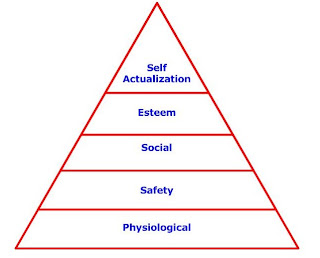This is an excellent case to illustrate a fact I had problems to understand: the accuracy of the information that brings us knowledge is much less important than the emotion it fixates in our brain, and which begins to influence our decisions.
I've learned from Falconi the importance of philosopher Maslow's work, which in the last century brought an important human focus to Deming's statistical theories. It played with the brain's right side, rounding the edges of the TQC's logical-mathematical approach.
Of Maslow's lessons I have permanent memories regarding human motivation:
1 - Our natural state is that of dissatisfaction (or neutrality); we have satisfaction impulses. Motivation is the product of the frequency and range of these peaks.
2 - These satisfaction peaks happen when we solve problems related to the 5 layers of basic necessity, characterized by Maslow as:
a. Physiological - such as hunger, sleep...
b. Security - maintaining job, patrimony...
c. Social - being accepted by family, friends...
d. Self-esteem – being free, independent, recognized
e. Self-actualization – achieving your own potential, working on what is your vocation, self-development.
3 - There is a hierarchy: the most basic needs must have been satisfied so that the superior layers may become important. If we are thirsty, as long as we don’t have anything to drink we'll have few social concerns, for instance;
4 - Later, I read in another book by the same author that above self-actualization there is donation, donating what we have for the benefit of others (a Maecenas is a good example).
Because it is a hierarchy, with more or less basic needs, almost every author refers to as a pyramid and represents it as such.
It is a very good representation, but Maslow' books don't have any images.
We can go into further detail as there are other more advanced needs said author presents and discuses.
To me these 5 suffice, added of a sixth layer representing many needs. They've helped me a lot in understanding and explaining routine motivational problems. If we hold a meeting to discuss Maslow, everybody will quote his pyramid and the five basic necessities. What others have for extra content is of very little importance for the (meaningful and representative) 80%...
Written by: Claus Süffert


No comments:
Post a Comment